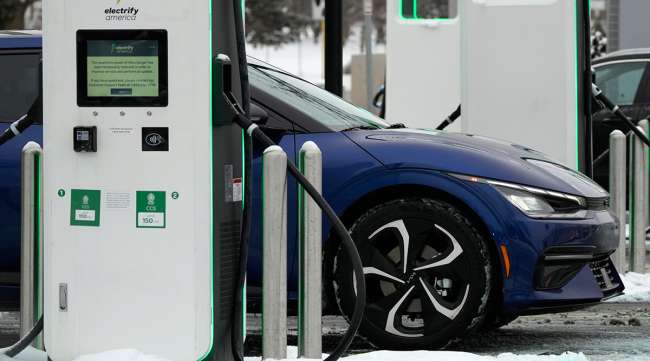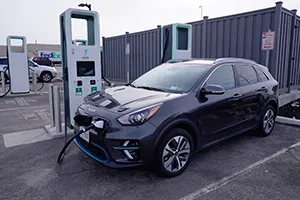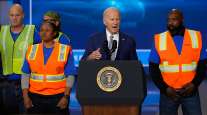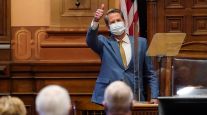Associated Press
DOT Announces $2.5 Billion Grant for Charging Infrastructure

[Stay on top of transportation news: Get TTNews in your inbox.]
WASHINGTON — The federal government on March 14 announced $2.5 billion in new grants for the construction of electric vehicle charging stations and alternative fueling infrastructure, partly aimed at increasing access along highway corridors for longhaul trucking.
Known as the Charging and Fueling Infrastructure or CFI program, the grants will be doled out over a five-year period, with an emphasis on both highway chargers but also locations in traditionally underserved and disadvantaged urban, rural and tribal communities.
A statement from the Department of Transportation said the grants will be targeted to “fill gaps in the national charging and alternative-fueling network.”
Transportation Secretary Pete Buttigieg said in the statement that the overarching goal is “modernizing our infrastructure and creating good jobs in the process.”
He hailed the fresh funding as “another big step forward in creating an EV future that is convenient, affordable, reliable, and accessible to all Americans.”

Steve Slesinski of Dana and Trent Broberg of Acertus pop the EV hood and reveal new, easier ways to repair, prepare and invest in electric trucks. Hear the program above and at RoadSigns.TTNews.com.
The $2.5 billion in funding is split evenly into two tracks: a Community Program which seeks to strategically distribute chargers in underserved locations in cities and communities; and a Corridor Program, which will focus on highways with the goal of establishing Alternative Fuel Corridors to enable gasoline-free cross-country travel and longhaul trucking.
The money builds on a separate $5 billion in federal money dedicated to growing a nationwide network of EV chargers specifically along highways. The Biden administration has been prioritizing construction on highway routes that can allow EV drivers to go long distances, at the expense for now of neighborhoods, shopping centers and apartment dwellings in more urban areas where chargers have been in relatively higher demand.

A Kia Nero charges at an Electrify America EV station in Manchester, N.H. (Charles Krupa/Associated Press)
Established by the Bipartisan Infrastructure Law, which was passed by Congress in November 2021, the grants come under the umbrella of President Joe Biden’s public goal of establishing 500,000 public EV charging stations and reducing national greenhouse gas emissions by at least 50% by the year 2030.
The department did not specify how many chargers it expects to help build off the latest round of funding. Direct-current fast chargers, which can charge a car up to 80% of its battery capacity in 20 to 45 minutes, are quite expensive, costing $40,000 to $100,000. That limits the number that can be built, but they enable drivers to quickly get back on a road such as a highway. Level 2 chargers are cheaper in cost but take a few hours to charge an EV, and are typically placed in neighborhoods and near schools, stores and offices.
In addition to electric chargers, the grants will fund the establishment of more hydrogen, propane, or natural gas refueling infrastructure. The EV charger funding will target new charging stations at public buildings, schools and parks as well as publicly accessible parking garages.
BIG NEWS >> @SecretaryPete and I just opened applications for the 1st round of a $2.5 BILLION program to build out EV infrastructure across the country. We're going to make sure our zero-emission future is accessible + affordable no matter where you live. https://t.co/NDBEflBYlu — Secretary Jennifer Granholm (@SecGranholm) March 14, 2023
Energy Secretary Jennifer Granholm said the new grants will provide a much-needed push for the growing electric vehicle industry. The rapid expansion of the electric vehicle market has strained the infrastructure in many cities, leading to consumer reluctance — especially for residents who can’t conveniently charge at home.
“Ensuring that charging stations are more visible and accessible in our communities addresses the concerns many American drivers have when considering making the switch to electric,” Granholm said in a statement.
— Associated Press writer Hope Yen contributed to this report.
Want more news? Listen to today's daily briefing below or go here for more info:




